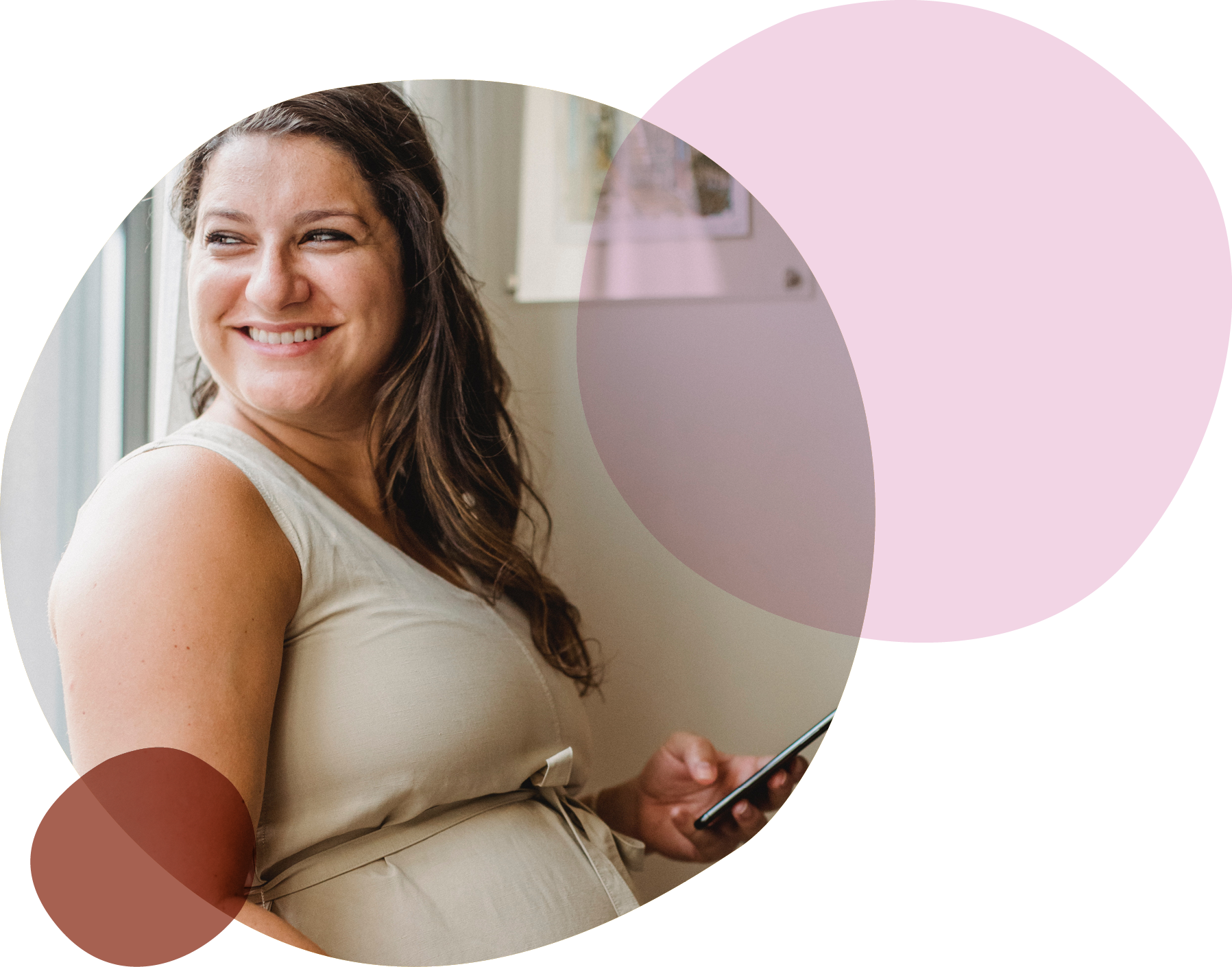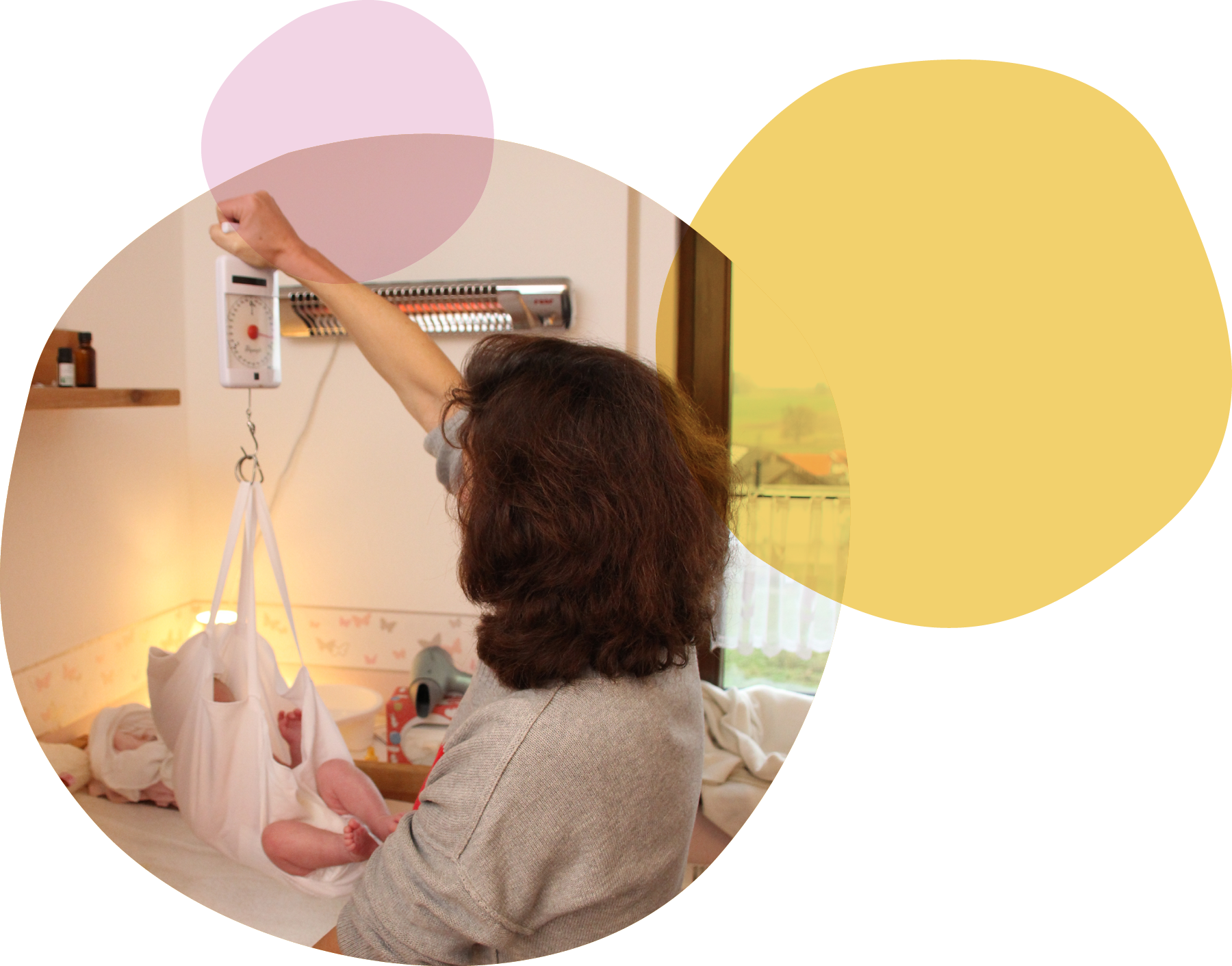Information for parents-to-be
We wish you all the best for your upcoming journey through your pregnancy, childbirth and the postpartum period.
In this section, we would like to inform you about the services a midwife can provide for you.

Services
Midwives provide comprehensive and competent counselling from the start of your pregnancy through to the end of your child's first year of life.
What many people may unfortunately not be aware of is that you are also entitled to midwifery assistance in case of an unfortunate event such as a stillbirth!
The costs for all these services are covered by statutory health insurance. If you have private health insurance, you should find out beforehand whether the midwifery services are covered by the contract according to Section 134a of the Sozialgesetzbuch V (German Social Code, Book V), Annex 1.1, Section 3 Para. 1. In this case, the midwife does not bill the health insurance company directly, but send the bill to you.
This service deals with all aspects of pregnancy and childbirth, addressing both medical and psychosocial concerns. Counselling can take place by telephone, video or as part of a home visit.
All the examinations recommended in the maternity guidelines (e.g. blood pressure measurement, urine, foetal heart tones from the 24th week of pregnancy, foetal position, fundal position, weight check, etc.), are usually offered by your gynaecologist, but can also be conducted by a midwife. Midwives use manual techniques to assess the position of the baby and the fundal status, while ultrasound examination of the fundus is performed exclusively by doctors.
Various antenatal classes are available, therefore, it is important that you consider which course best suits your needs. Most courses are covered by health insurance up to a maximum of 14 hours.
Here are some examples of the courses on offer:
- Couples' Course (involves a fee for the partner)
- Women-Only Course
- Course for Women Expecting Multiple Children
- Hypnobirthing
The courses contain basic information on pregnancy, birth, the postpartum period and newborn-care. They also cover topics such as postures to relieve discomfort during pregnancy, nutrition, and other pregnancy-related topics. To loosen up, practical parts such as exercises for flexibility, loosening up, stretching and relaxation are shown and performed. Breathing and labour exercises also form an important part of the courses.
It is important to determine the most suitable place for you to give birth in advance. We, or, of course, another midwife, are here to provide advice.
In Würzburg, there are the following options for giving birth:
In the hospital
In the birthing centre
Home birth
For all types of births, midwives can accompany the entire physiological birth process independently and without a doctor’s assistance.
The first 8 weeks after birth are called the postpartum period. This is the time when the family finds its way together and gets used to each other. The mother, in particular, requires time to rest and process the birth, recover physically, establish a breastfeeding routine and bond with her baby.
At the postpartum visits, parents have the opportunity to talk to the midwife about their birth experiences and the new family roles.
Additionally, the midwife can offer guidance on various aspects, including:
- The postpartum process
- The healing process
- Breastfeeding (e.g. breastfeeding environment, breastfeeding positions/techniques, nipple soreness, blocked milk ducts (breast engorgement) and the risk of mastitis)
- Postpartum and regression exercises
- Debriefing of the birth
- Breast inspection and care (e.g. assistance with milk engorgement, the risk of mastitis and nipple soreness)
- Assessment and care of birth injuries or caesarean sutures
- Examination and, if necessary, support in the regression of pregnancy- and birth-related genital and extra-genital changes
- Postpartum hygiene
- Strengthening parental skills, bonding security and family cohesions in the new life situation
- Counselling, implementation and instruction in postpartum gymnastics (e.g. incontinence, thrombosis prophylaxis)
- Implementation of special medical measures, prescribed by the doctor, and, if necessary, special support in coping with traumatic experiences in connection with pregnancy or birth
Source: Service description for the contract on Midwifery Assistance Section 134 of the German Social Code, Book V (SGB V)
- Recording and assessment of vital signs and general condition
- Information on newborn screening, U2/U3, prophylactics and vaccinations
- Weight control
- Navel care
- Control of excretions
- Visual bilirubin check
- Handling the infant and practical care instructions, as well as safety precautions (e.g. changing table safety, pets)
- Recognising the needs and problems of the infant, documenting the observations and discussing the resulting measures with the parents
- Information on caries prophylaxis
Source: Service description for the contract on Midwifery Assistance Section 134 of the German Social Code, Book V (SGB V)
You can start the postnatal regression course at the earliest 6 weeks after childbirth, but no later than at the end of the 9th month after birth. During this period, the statutory health insurance will cover the costs of the course.
The regression course covers the following topics:
- Information about physical changes and measures after pregnancy, birth and the postpartum period
- Explanation of the pelvic floor function and internal organ position
- Perception, control and strengthening of the pelvic floor (including prevention of prolapse and incontinence)
- General strengthening of the musculoskeletal system through exercises (information and practical guidance on daily activities with a baby, e.g. lifting, carrying and standing - ergonomics)
- Vein training, body work, e.g. relaxation exercises
Please register for the regression course only after the birth of your child!
Pregnancy counselling
- Information on legal entitlements (parental allowance, child benefit, etc.)
- Support in dealing with the authorities
- Financial assistance from the state foundation “Hilfe für Mutter und Kind” (Help for Mother and Child)
- Addressing personal questions about pregnancy, childbirth and the time thereafter
- Support before, during and after a medical diagnosis of my unborn child
- Support during crises after birth (including “baby blues” – postpartum depression)
Further information and contacts:
Schwangerschaftsberatung im Evangelischen Beratungszentrum
(Pregnancy counselling at the Evangelical Counselling Centre)
Tel. 0931 – 4044855
www.diakonie-wuerzburg.de/ssb
Landratsamt Würzburg - Schwangerschaftsberatung
(Würzburg district office – Pregnancy Counselling)
Tel. 0931 – 8003-5990
www.schwanger-in-wuerzburg.de
Pro Familia - Schwangerschaftsberatung
(Pro Familia – Pregnancy Counselling)
Telefon 0931 – 460650
www.profamilia.de/wuerzburg
Sozialdienst katholischer Frauen e. V.
(Social Service of Catholic Women)
Telefon 0931 – 13811
www.schwanger.skf-wue.de
-----
Koki - (Coordinating Child Protection Agency):
KoKi accompanies and supports pregnant women, parents and single mothers and fathers with children who are facing challenging life situations.
Further information and contacts:
KOKI Stadt Würzburg:
(KOKI City of Würzburg)
www.wuerzburg.de
koki@stadt.wuerzburg.de
KOKI Landkreis Würzburg:
www.landkreis-wuerzburg.de
koki@lra-wue.bayern.de
No midwife found?
On-call service
The on-call service caters for women who have NOT secured a midwife until after childbirth, or whose midwife is currently unavailable due to holiday!
If you want to make use of the on-call service, please proceed as follows
1. For requests for home visits, please send an email with the subject "on-call service" to info@wuerzburg-hebammen.de.
Please include your address, telephone number and your child's date of birth.
2. Our midwife referral agency will get in touch with you.

Please bear in mind
The on-call service is primarily responsible for urgent midwifery matters concerning the well-being of mother and child. Home visits are usually scheduled for 30 to 60 minutes, so that we can assist as many families as possible. The duration of the visit depends on the health status of the mother and baby, as well as the number of visits the midwife must attend to that day. Should you have any enquiries, please do not hesitate to contact us at the midwifery referral office.
